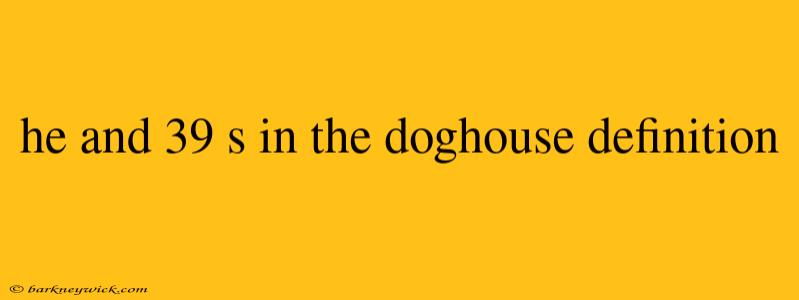He's in the Doghouse: Understanding the Meaning and How to Get Out
We've all been there, haven't we? That sinking feeling of knowing you've messed up, and the person you care about most is not happy with you. It's a universal experience, one that many of us have faced with a partner, friend, or family member. But what exactly does it mean to be "in the doghouse"? And how can we navigate this tricky territory?
My Own Experience: The Great Pancake Disaster
Let me tell you about a time I was firmly planted in the doghouse. It was Valentine's Day, and I decided to surprise my wife with homemade pancakes. I thought it would be a romantic gesture, a delicious way to start the day. But my plan went awry, to say the least.
I confidently flipped the first pancake, only to have it stick to the pan, leaving a charred and unusable mess. The remaining pancakes followed suit, each one a culinary disaster. By the time I was done, the kitchen looked like a battlefield, and I was left with a plate of burnt batter and a very disappointed wife. Let's just say, I spent the rest of the day in the doghouse, and it wasn't a pleasant place to be.
Understanding "In the Doghouse"
While my pancake saga may seem comical now, the phrase "in the doghouse" represents a real and often uncomfortable situation. It means being in a state of disfavor, usually with a romantic partner. Essentially, you've done something wrong, and you're experiencing the consequences, which can include a cold shoulder, withdrawn communication, or even a period of separation.
Why Being in the Doghouse Can Be So Unpleasant
In my opinion, the worst part about being in the doghouse is the feeling of isolation and uncertainty. You're left wondering what you did wrong, how to fix it, and how long you'll have to endure the consequences. It can be a difficult and emotionally draining experience.
Getting Out of the Doghouse: Steps to Reconciliation
While it's important to acknowledge the pain you've caused and give your partner space, there are things you can do to begin the process of reconciliation. Here's a helpful guide:
- Acknowledge your mistake: The first step is to sincerely apologize and acknowledge your actions. Don't make excuses or try to minimize your wrongdoing.
- Listen and empathize: Give your partner the space to express their feelings without interruption. Try to understand their perspective and acknowledge their hurt.
- Make amends: If possible, take concrete steps to make amends for your actions. This might involve making a gesture of kindness, apologizing to others affected by your behavior, or taking responsibility for the consequences of your actions.
- Change your behavior: If your actions were a result of a pattern of behavior, it's time to address the underlying issues. This might involve seeking counseling, therapy, or support from friends and family.
- Patience and persistence: Reconciliation takes time. Don't expect instant forgiveness. Be patient, persistent, and show your partner you're committed to change.
Remember: It Takes Two
It's important to remember that reconciliation is a two-way street. While you can take steps to make amends, it's ultimately up to your partner to decide whether they are willing to forgive you. Be prepared for the possibility that the relationship may not recover, but with open communication, empathy, and a genuine desire to change, you can increase your chances of getting back on track.
The Importance of Learning and Growing
My pancake disaster wasn't just a funny story; it was a learning experience. It taught me that even the simplest gestures can have unintended consequences. It also reminded me of the importance of communication, empathy, and the need to always prioritize the happiness of my loved ones.
Even though I was "in the doghouse" that Valentine's Day, I learned a valuable lesson about respecting my partner's feelings and making thoughtful choices. It's a lesson I try to keep in mind, and I believe it's a valuable one for anyone navigating the complexities of relationships.
